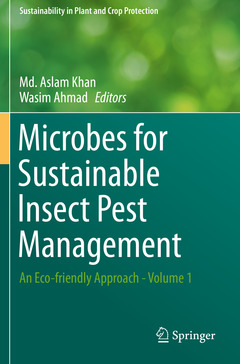Microbes for Sustainable Insect Pest Management , 1st ed. 2019 An Eco-friendly Approach - Volume 1 Sustainability in Plant and Crop Protection Series
Coordonnateurs : Khan Md. Aslam, Ahmad Wasim

This Volume comprises 14 chapters in an attempt to provide the reader with available information on safe and effective use of entomopathogens. Chapters in this book dealing with soil-borne entomopathogens and their phylogeny also provide a review on most updated information of their isolation and molecular identification. Employing fungal pathogens in biological control programmes plays a key role, and conidial thermotolerance and oxidative stress are examined in separate chapters. Entomopathogenic bacteria are able to kill their hosts quickly. An important contribution concerns informations provided upon bacterial cytotoxic factors on insect haemocytes. Nematodes are biological control agents safe to the environment. The information with respect to their direct and indirect effects on non-target organisms is provided. Viruses as highly specific, virulent candidates for use as biological insecticides are safe to non-target species. A separate chapter on the role of granuloviruses in IPM contributes a wealth of information. Biopesticides in combination with synthetic insecticides are reported as effective, economic, and eco-friendly. Understanding their interactions will certainly promote their uses. Finally, emphasis has been given on reviewing synergistic and antagonistic interactions of microbial and chemical pesticides, in other chapters.
1. Synthetic Chemical Insecticides: Environmental and Agro Contaminants.- 2. Soil-Borne Entomopathogenic Bacteria and Fungi.- 3. Molecular Phylogeny of Entomopathogens.- 4. Potential of Entomopathogenic Bacteria and Fungi.- 5. Ascomycota and Integrated Pest Management.- 6. Thermotolerance of Fungal Conidia.- 7. Oxidative Stress in Entomopathogenic Fungi and its Potential Role on Mycoinsecticide Enhancement.- 8. Effects of Cytotoxic Factors Produced by Entomopathogenic Bacteria on Insect Haemocytes.- 9. Effects of Entomopathogenic Nematodes and Symbiotic Bacteria, on non-target Arthropods.- 10. Granuloviruses in Insect Pest Management.- 11. Interactions of Entomopathogens with Other Pest Management Options.- 12. Toxicological Prospects on Joint Action of Microbial Insecticides and Chemical Pesticides.- 13. Entomopathogen and Synthetic Chemical Insecticide: Synergist and Antagonist.- 14. Current State of Fungal Antagonists with Special Emphasis on Indian Scenario.
Wasim Ahmad Ph. D (1981), D. Sc (1993) in Nematology (Zoology) from Aligarh Muslim University is a Professor (full) of Nematology at Department of Zoology, Aligarh Muslim University, India. He has wide experience of working in leading Nematology laboratories of the world and has published extensively on nematode taxonomy, ecology and the role of Entomopathogenic nematodes in insect biocontrol. He is recipient of several national and International awards and is Fellow of the National Academy of Sciences (FNASc) and the National Academy of Agriculture Sciences (FNAAS) India.
This volume is expected to be of great help to post-graduate students and researchers in plant protection
Information provided is up-to-date and fully focused on applied aspects
Volume is compiled with the contribution of legend workers in insect pest management
Date de parution : 09-2020
Ouvrage de 396 p.
15.5x23.5 cm
Disponible chez l'éditeur (délai d'approvisionnement : 15 jours).
Prix indicatif 158,24 €
Ajouter au panierDate de parution : 09-2019
Ouvrage de 396 p.
15.5x23.5 cm
Disponible chez l'éditeur (délai d'approvisionnement : 15 jours).
Prix indicatif 158,24 €
Ajouter au panierThème de Microbes for Sustainable Insect Pest Management :
Mots-clés :
biocontrol; Biopesticide; Entomopathogen; Microbial Management; Insect Pest; Entomology



